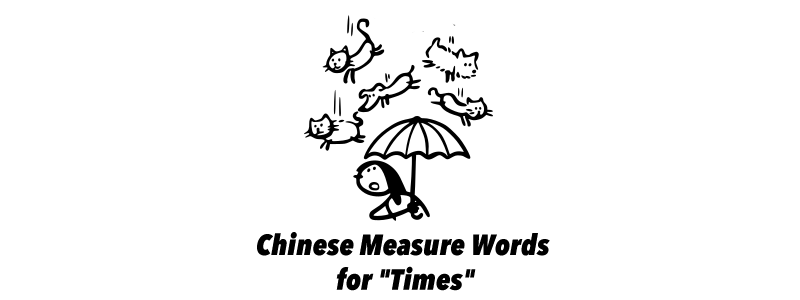Grammar Point:
Chinese measure words are used to quantify nouns and indicate the number or frequency of an action or event. When it comes to the concept of “times” or occurrences, there are several measure words that can be used in Chinese, including 遍 biàn, 次 cì, 场 chǎng, 回 huí, and 下 xià.
遍 biàn:
- It is used to express a complete and comprehensive repetition of an action or event.
- It is often used when referring to going through a set of items, visiting a place, or completing a full cycle.
這本書我看了兩遍这本书我看了两遍
I have read this book twice.
這衣服我洗了三遍還是不乾淨这衣服我洗了三遍还是不干净
I’ve washed this cloth three times, but it is still not clean.
洗衣機的使用方法我已經說了很多遍了洗衣机的使用方法我已经说了很多遍了
The use of the washing machine I have said many times.
次 cì:
- It is a versatile measure word that can be used to indicate the number of times an action or event occurs.
- It is commonly used in everyday conversations to express frequency or repetition.
- The term 次 cì can be used almost interchangeably with 遍 biàn, 场 chǎng, 回 huí, and 下 xià, but not the other way around.
你再說一次你再说一次
Say it one more time.
我每天都要喝三次咖啡我每天都要喝三次咖啡
I drink coffee three times a day.
我已經去過幾次上海了我已经去过几次上海了
I’ve been to Shanghai a few times.
Note: This Measure Word can be placed either in front of an object or after the object.
場/场 chǎng:
- It is specifically used to count occurrences of events or activities that take place in a specific location or venue.
- It is often used for activities such as performances, concerts, meetings, or games.
今天早上下了一場大雨今天早上下了一场大雨
There was heavy rain this morning.
我這個月要參加兩場婚禮我这个月要参加两场婚礼
I will attend two weddings this month.
台灣每年有四場球賽台湾每年有四场球赛
There are four games in Taiwan every year.
回 huí:
- It is used to count the number of times an action is repeated or an event is revisited.
- It suggests a return or repetition of an action or event.
我和他見過三回我和他见过三回
I have met him three times.
我去過加拿大五回了,還是覺得那裡很美我去过加拿大五回了,还是觉得那里很美
I have been to Canada five times, and I still think it’s beautiful there.
因為忘了帶東西,她公司家裡跑了三回因为忘了带东西,她公司家里跑了三回
Because I forgot something, she had to go back and forth between her company and home three times.
下 xià:
- It is a measure word used to count instances of doing or experiencing something.
- It indicates the next occurrence or the next round of an action.
她打了我一下她打了我一下
She slapped/hit me once.
那個人推了我幾下那个人推了我几下
That person pushed me a few times.
我不小心踩了一下他的腳我不小心踩了一下他的脚
I accidentally stepped on his foot. (one time)


